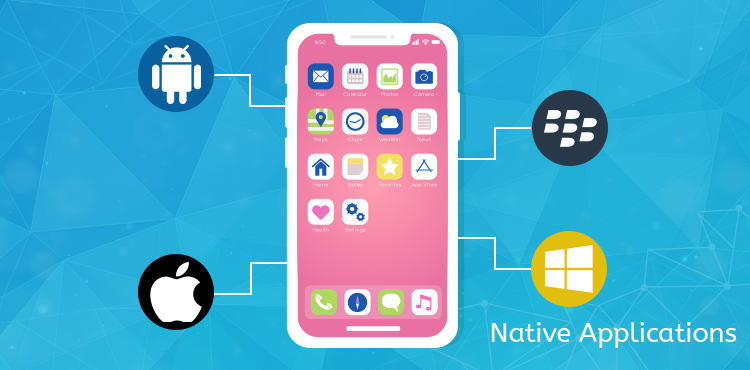


A native mobile app is intimately tied to the platform on which it is running. It has the ability to fully integrate with the capabilities of both the hardware and the OS on which it resides. It is completely analogous to most PC applications, which are downloaded to a desktop’s or laptop’s hard drive and completely executed within that machine.
In order to accomplish this tight integration, the mobile app developer utilizes an SDK from the hardware manufacturer directly or via the mobile device’s OS vendor. Combined with a comprehensive development tool, the IDE, a developer is able to code the mobile application logic and take advantage of any hardware or OS functionality that is available via the exposed APIs.
Through the APIs, the native app can utilize OS features and services such as the file system, the phone and network drivers. It can interact also with built-in resources such as contacts, multimedia files, calendars, email, browsers and other productivity components. Lower-level APIs provide direct access to specific hardware capabilities such as screen gestures, virtual and hard buttons, sliders, graphics, the audio system, GPS, accelerometers and so on.
Owing to its close relationship with the execution platform, native mobile apps also have full access to the proprietary graphical user interface widgets and functions through a proprietary development environment. Although these IDEs are usually expensive initially, they save time by automating UI creation and providing more complete run-time and compile-time error detection.
• Functionality: Native apps have direct access to all a mobile device’s features including ones that are unique to the platform. These include graphics hardware, motion, location, proximity, visual and audio sensors. Mobile devices may also possess unique security devices, touchscreen functions and peripheral interfaces only available via native libraries.
• Performance: Since they run directly on the platform without intermediary containers or abstraction layers, native applications run with the highest performance possible. Native IDEs offer the best runtime optimizations as well.
• User Experience: The ability to directly access UI components of specific platforms means that apps can seamlessly blend with the operating environment. Given that native UI layout and functionality also matches the platform, this eliminates disruption to the user experience.
• Costs: Software development environments differ between manufacturers and OS vendors. Thus, each native app must be written in specific programming languages to specific APIs with SDKs and tools for that particular platform. Furthermore, device capabilities may differ between manufacturer models that affect how a native app functions. All of this uniqueness means that to cover every device in a fragmented mobile market requires double or treble the effort in development and maintenance as compared to a one-size-fits-all approach. If the enterprise strategy is to focus solely on one platform, then these additional efforts do not accrue. Alternatively, the purchase of a 3rd-party cross-platform, native development SDK can approximate write-once-run-everywhere capability for native apps but at increased initial cost.